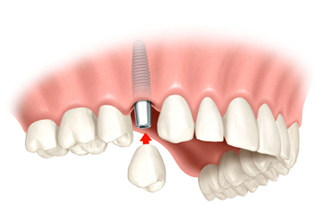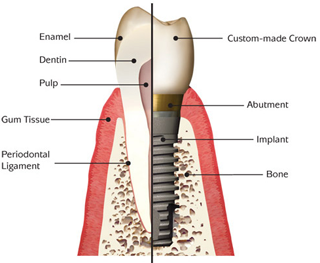The ideal, natural-looking option
Do you:
• Hide your smile because of spaces from missing teeth?
• Feel your dentures are not secure?
• Have difficulty chewing?
• Wish you could smile, speak and eat in comfort and with confidence, but are missing one or more teeth?
If so, then dental implants are for you. Commonly referred to as the 'third set' of teeth after the first two have been lost (baby teeth, adult teeth), dental implants can replace any number of teeth, from a single tooth to a complete set.
What exactly are dental implants?
A dental implant is commonly made of titanium, a metal that is well-tolerated by the body, which is placed into the jawbone. It is used to support one or more false teeth. A small attachment at the top of the implant emerges through the gum. Crowns, bridges or dentures can then be attached to the implant by screws or clips.
For people in good general health who have lost a tooth or teeth due to disease, an injury, or some other reason, dental implants are an ideal option. They are so natural-looking; you may forget you ever lost a tooth!
What types of dental implant are there?
There are 2 common types of implant used today:
1. Endosteal (in the bone): This is the most commonly used type of implant. The various types include screws, cylinders or blades surgically placed into the jawbone. Each implant holds one or more prosthetic teeth. This type of implant is generally used as an alternative for patients with bridges or removable dentures.
2. Subperiosteal (on the bone): These are placed on top of the jaw, with the metal framework's posts protruding through the gum to hold the prosthesis. These types of implants are used for patients who are unable to wear dentures and who have minimal bone height.
How long do dental implants last?
Dental implants have been used for over 30 years to replace missing teeth. Depending upon how you look after them, they can last a lifetime.
Benefits of Dental Implants
For many people, dental implants can last a lifetime, providing welcome relief from the noticeable signs of aging that premature tooth loss can hasten. They will blend naturally with your remaining teeth, without damaging them. In fact, dental implants can preserve the adjacent bone and gum tissue that is often worn down with conventional dentures and bridgework. Dental implants can provide our patients with the self-confidence that a complete smile can bring.




